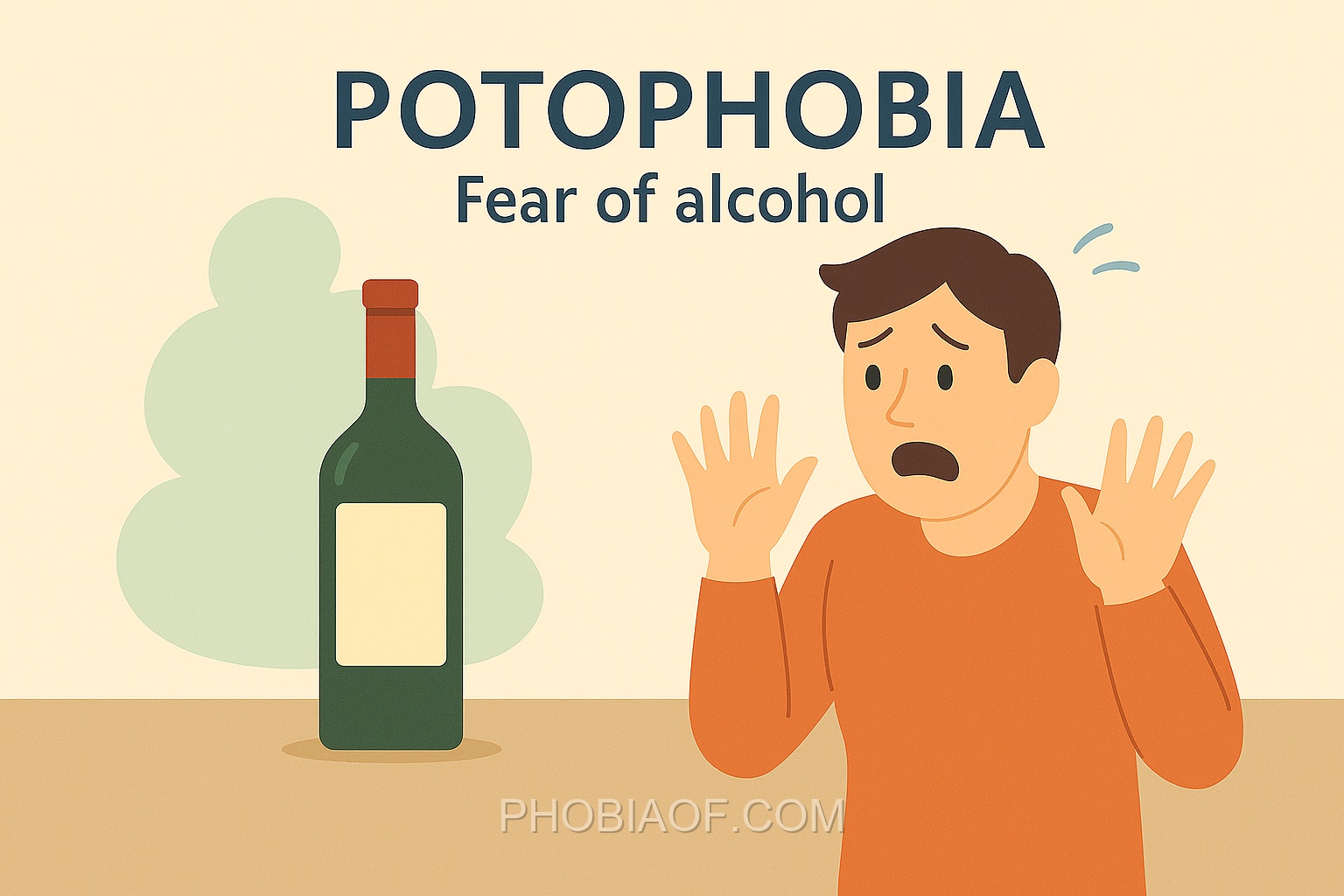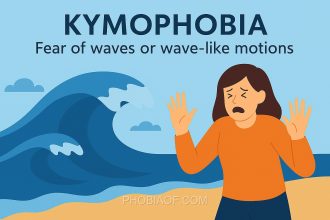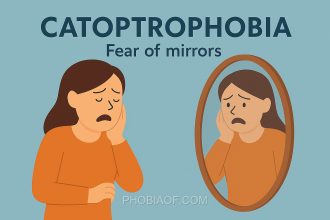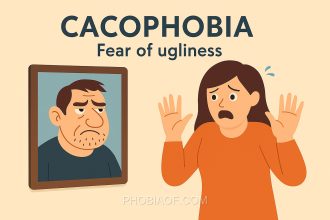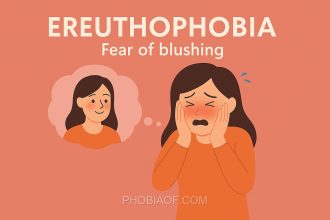Have you ever felt a discomfort or unease at the mere thought of alcohol? While many people enjoy a glass of wine with dinner or a celebratory toast, for some individuals, the idea of alcohol can provoke a deep-seated fear known as Potophobia.
Potophobia is the fear of alcohol. The term is derived from the Greek word “poto,” meaning drink, and “phobia,” which signifies fear. Although it’s normal to have reservations about the effects of alcohol, Potophobia goes beyond simple caution. It can manifest as an intense, irrational fear or anxiety when encountering alcohol in any form, whether it’s seeing a bottle, smelling the drink, or even discussing it.
This fear can significantly affect a person’s life. Individuals with Potophobia may experience anxiety attacks, avoidance behavior, or social isolation due to their fear. It can interfere with social interactions, as gatherings often involve alcoholic beverages, making it challenging for those affected to participate in events comfortably.
The impact of Potophobia varies, but understanding and addressing this condition with empathy and professional support can help individuals manage their fear and improve their quality of life. If you or someone you know struggles with Potophobia, seeking guidance from a mental health professional can be an important step toward overcoming this phobia.
Causes of Potophobia
Potophobia, the fear of alcohol or alcoholic beverages, can arise from various factors. Understanding these causes can help in addressing the phobia effectively. Below are some common reasons why someone might develop potophobia:
- Genetic Predisposition:
Some individuals may have a genetic inclination towards anxiety disorders, including specific phobias. Family history of phobias or anxiety can increase the likelihood of developing potophobia.
- Traumatic Experiences:
Experiencing or witnessing traumatic events involving alcohol, such as accidents or abusive situations, can lead to the development of potophobia. The fear serves as a protective mechanism to avoid perceived danger.
- Learned Behavior:
Observing family members or peers who have a fear of alcohol can lead to the adoption of similar fears. This learned behavior can be particularly influential during childhood.
- Psychological Factors:
Other mental health conditions, such as generalized anxiety disorder or obsessive-compulsive disorder (OCD), can contribute to the development of specific phobias like potophobia.
- Environmental Factors:
Growing up in an environment where alcohol is associated with negative consequences or viewed negatively can instill a fear of alcohol. Cultural and societal attitudes towards alcohol also play a role.
While research on potophobia specifically is limited, these factors are consistent with the development of many specific phobias. Understanding and addressing these causes can be a critical step in managing and overcoming the fear of alcohol.
Symptoms of Potophobia
Potophobia, an intense fear of alcohol, can manifest in both physical and emotional symptoms. Understanding these symptoms is essential for recognizing the phobia in oneself or others. The following list outlines common symptoms:
- Intense Fear or Anxiety: Individuals may experience a profound sense of fear or anxiety when thinking about, seeing, or being near alcohol.
- Panic Attacks: Exposure to triggers may lead to panic attacks, characterized by feelings of terror, chest pain, dizziness, or shortness of breath.
- Increased Heart Rate: A rapid or pounding heartbeat can occur when faced with triggers related to alcohol.
- Sweating: Individuals may experience excessive sweating when exposed to situations involving alcohol.
- Trembling or Shaking: Physical trembling or shaking might occur as a response to anxiety about alcohol.
- Avoidance of Triggers: A strong desire to avoid places or situations where alcohol might be present, such as social gatherings or restaurants.
- Overwhelming Dread: A persistent and overwhelming sense of dread about encountering alcohol or situations involving alcohol.
- Emotional Distress: Feelings of distress, helplessness, or depression about the inability to control the phobia.
These symptoms can significantly interfere with daily life, making it challenging to engage in social activities, maintain relationships, or perform daily tasks if the phobia is severe.
Treatment for Fear of Alcohol (Potophobia)
Fear of alcohol, known as Potophobia, can be daunting, but it is a manageable and treatable condition. With the right approach and support, individuals can overcome this phobia and lead fulfilling lives. Below are some treatment options and coping strategies that have proven effective.
Proven Therapies
- Exposure Therapy: This involves gradually and systematically facing the fear in a controlled environment. By slowly introducing the feared object or situation, individuals can reduce their anxiety over time.
- Cognitive-Behavioral Therapy (CBT): CBT helps in altering the distorted thoughts and beliefs associated with the fear of alcohol. By restructuring these thoughts, individuals can change their emotional response to alcohol.
- Counseling: Speaking with a mental health professional can provide a safe space to explore the roots of the phobia and develop personalized coping strategies.
Self-Help Coping Techniques
- Relaxation Exercises: Practices such as deep breathing, progressive muscle relaxation, and guided imagery can help manage anxiety symptoms.
- Meditation: Regular meditation can increase mindfulness and reduce stress, offering better control over fear responses.
- Support Groups: Connecting with others who share similar experiences can provide encouragement and practical advice in a supportive environment.
Additional Considerations
In some severe cases, medication such as anti-anxiety medications might be prescribed by a healthcare provider to help manage symptoms. However, the focus remains on therapy and developing coping skills.
Remember, seeking professional help is a strong and positive step if Potophobia is interfering with your daily life. With dedication and the right support, overcoming the fear of alcohol is entirely possible.
Conclusion
Understanding potophobia, or the fear of alcohol, is a crucial step in addressing and managing this phobia. By recognizing the causes and symptoms, individuals are better equipped to confront their fears and seek the necessary support. This knowledge not only empowers those affected but also fosters a sense of control and hope.
It’s important to remember that many people have successfully overcome or managed their phobias with time and appropriate help. Whether through therapy, support groups, or medical advice, there are multiple pathways to finding relief and peace of mind.
Take action today: If you or someone you know is struggling with potophobia, consider reaching out to a mental health professional or talking to a doctor. Professional guidance can provide valuable tools and strategies to manage your fear effectively.
With patience, perseverance, and the right support, overcoming potophobia is entirely possible. Embrace the journey towards a life free from the constraints of fear, and remember that you are not alone in this process. Stay hopeful and informed, and take the first step towards reclaiming your well-being.
